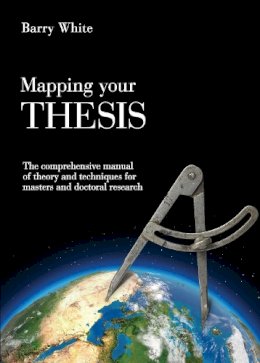
Stock image for illustration purposes only - book cover, edition or condition may vary.
Mapping Your Thesis
Barry White
€ 104.08
FREE Delivery in Ireland
Description for Mapping Your Thesis
Paperback. If this book provided a set of rules to be learned and applied, writing a thesis might seem pleasingly easy. But because writing a thesis is seldom easy, the book instead offers a more complex mapping of the process. The purpose is to raise awareness of, and provide grist for reflection on, the critical choices research and thesis writing involves. Num Pages: 448 pages. BIC Classification: GPS; JNM. Category: (P) Professional & Vocational. Dimension: 242 x 177 x 25. Weight in Grams: 842.
If this book provided a set of rules to be learned and applied, writing a thesis might seem pleasingly easy. But, because writing a thesis is seldom easy, the book instead offers a more complex mapping of the process.
The purpose is to raise awareness of the critical choices involved in research and thesis writing for both masters and doctorates. Running as a leitmotif throughout is the notion that no conceptual construct can be complete unto itself. Concepts can only be defined in terms of their dynamic relations with other constructs. It is in this context that the three broad methodological categories informing discussion in the book - exegetic, empirical, and qualitative - were adopted for didactic purposes only: at no time are they considered autonomies. Therefore, not only can they be compared in multiple ways, their shared continuities are often as significant as their differences.
Nonetheless, as in the case of different disciplines, differing methodological positions have different textual outcomes. Writing a masters' or doctoral thesis is not only an inherently idiosyncratic exercise, it is also epistemic and, in the current intellectual climate, rhetorical. The malleability of the disciplinary and methodological vocabularies used in academic rhetorics reflects the manner in which not only words but also styles of writing evolve to suit particular purposes.
For this reason, the style of writing and the words used in a thesis will need to be interrogated with the same informed intensity applied to all other aspects of the research undertaking. Only then, with the drawing of a more complex cognitive map, will a definition incrementally develop of what - in terms of a researcher's own needs - constitutes sound academic discourse.
The purpose is to raise awareness of the critical choices involved in research and thesis writing for both masters and doctorates. Running as a leitmotif throughout is the notion that no conceptual construct can be complete unto itself. Concepts can only be defined in terms of their dynamic relations with other constructs. It is in this context that the three broad methodological categories informing discussion in the book - exegetic, empirical, and qualitative - were adopted for didactic purposes only: at no time are they considered autonomies. Therefore, not only can they be compared in multiple ways, their shared continuities are often as significant as their differences.
Nonetheless, as in the case of different disciplines, differing methodological positions have different textual outcomes. Writing a masters' or doctoral thesis is not only an inherently idiosyncratic exercise, it is also epistemic and, in the current intellectual climate, rhetorical. The malleability of the disciplinary and methodological vocabularies used in academic rhetorics reflects the manner in which not only words but also styles of writing evolve to suit particular purposes.
For this reason, the style of writing and the words used in a thesis will need to be interrogated with the same informed intensity applied to all other aspects of the research undertaking. Only then, with the drawing of a more complex cognitive map, will a definition incrementally develop of what - in terms of a researcher's own needs - constitutes sound academic discourse.
Product Details
Format
Paperback
Publication date
2011
Publisher
Australian Council Educational Research (ACER) Australia
Number of pages
448
Condition
New
Number of Pages
448
Place of Publication
Camberwell, Australia
ISBN
9780864318237
SKU
V9780864318237
Shipping Time
Usually ships in 7 to 11 working days
Ref
99-1
Reviews for Mapping Your Thesis
